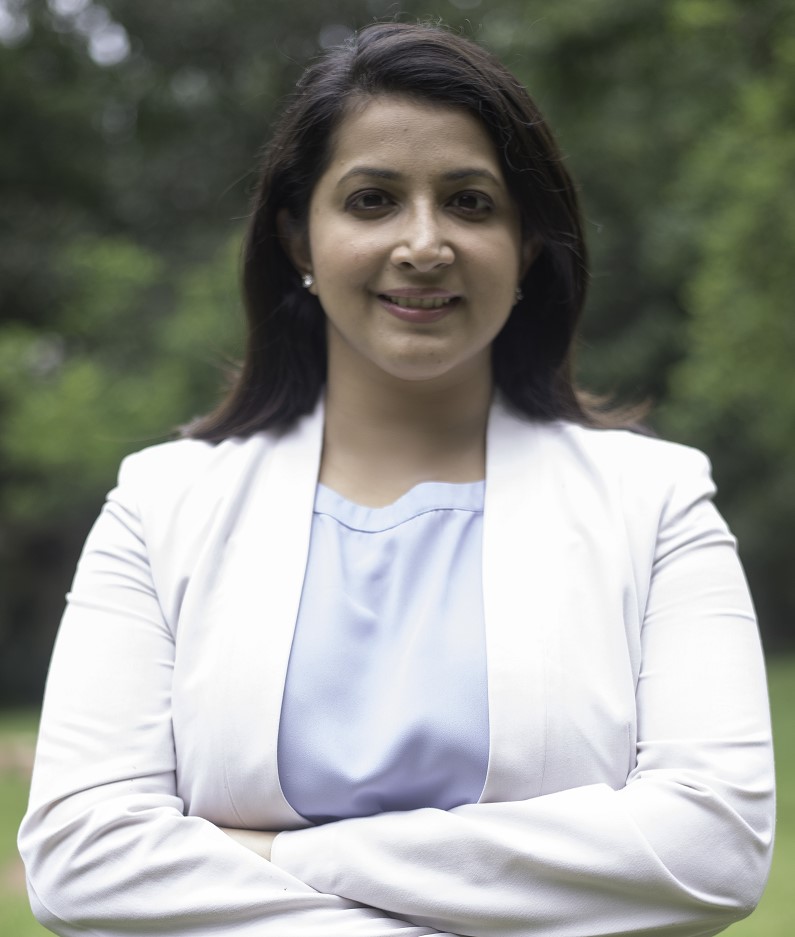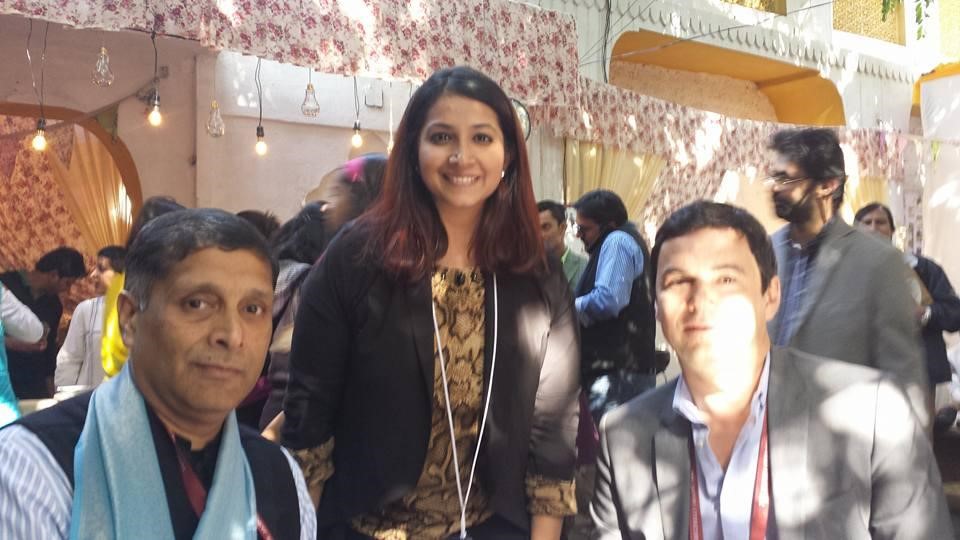
The thinking never stops for policy specialist and MPP alumna Tanvi Ratna, but she’s simply doing what comes naturally.
“I’ve always had that curiosity about connecting the dots from my science and engineering days,” she says. “So even if I read about something like the ozone layer, I will consider the different implications, like how it's going to impact a common man in Asia.”
Tanvi admits that she loves learning, and in her opinion, the ability to relax the mind is key to learning success.
“Asians come from competitive cultures, and I’ve seen my peers struggle with overwork. When you burden your brain with stress, it becomes inefficient,” she says. “For effective learning, it’s important to learn how to absorb more information in less time. Rather than cramming, techniques like meditation have been integral for me in developing that skill.”
Read on for Tanvi’s story and her advice for aspiring policy consultants, in her own words.

Tanvi with Arvind Subramanian (left), economist and Former Chief Economic Adviser to the Government of India, and Thomas Piketty (right), economist
[ALUMNI-INFO TEXT="Policy 4.0 is an innovative research and advisory body that I've started. Our work is on paradigm shifts in governance, starting with the next generation of money—digital currencies, crypto currencies—and the government-related issues that are linked to the future of money. So there's monetary policy, regulatory policy, and a lot of public policy.
The economy is the basis of our lives. But now that money itself is becoming programmable, that’s going to have far-reaching implications on everything, from the way economies and societies are organised, to how controls are implemented, how business is conducted, and how transactions happen in society. It’s affecting the fundamentals of society, and it’s transformative. For example, our first publication is a deep dive into the Chinese digital yuan project, and the implications that this one project will have for the world are immense.
At Policy 4.0, we deal with policy for a changing world. Covid-19 has made our day-to-day work harder, because a lot of government work is face-to-face, and it does get impacted when we use the virtual space. But in terms of the nature of what we do, I appreciate how Covid-19 has expedited certain paradigm shifts, such as moving people into the digital economy."][/ALUMNI-INFO]
***
I left a promising engineering career to move into policy. I studied engineering at Georgia Tech and I graduated summa cum laude. I could’ve gone to Silicon Valley, but I always had a passion for policy. It was in my second year of university that I did my first policy class in international relations, and I just knew that this was the field I wanted to work in.
Switching from engineering to the social sciences was not easy. When you are an engineer, there is a right answer to things. But in policy, there are no right answers. You’re dealing with human problems in society, and it’s not black or white. That took time to adjust to.
[ALUMNI-QUOTES TEXT="I gained a lot of exposure from the LKY School, right from the start. I remember that ex-British prime minister Tony Blair was invited for a town hall that coincided with our orientation. He said that we are entering an age where governments have to be enablers, and that has stayed with me. I believe that individuals are getting much more empowered, and a smart government will support that process.
The LKY School also helped me to be more aware of the Asian identity. At College Green, we lived with people from almost 50 countries, including many Asian countries. I had a Korean housemate, which is why I learned a lot about Korean culture. In fact, when I visited South Korea for the first time to attend a government blockchain event, the parliamentarians were amazed that I knew about things like jimjilbangs (public bathhouses) and hanoks (traditional Korean houses), because they weren’t expecting that from an Indian person!
But the biggest advantage of being at the LKY School, was that it created an environment where we were all equals. As part of my work, we have to interact with government officials and bureaucrats, and my peers have asked me, “How are you so comfortable with them?” Because typically, in an Asian culture, there is fear of authority. At the LKY School, you could be friends and have conversations with someone who might turn out to be your boss’s boss. I think that experience is invaluable."][/ALUMNI-QUOTES]
***
I’ve had several LKY School graduates reach out to me for advice on consulting, and what I always say is that consulting is about you—you are the product. If you are interested in consulting, you should have an analytical approach to things, because it is very much about the way that you think.
In my career, I’ve been intentional about taking a “360-degree approach” to work on policy from different dimensions—the political, bureaucratic, private, and academic sectors. I’ve worked with political leaders like Indian prime minister Narendra Modi, private sector firms like Ernst & Young, multiple ministries and state governments, as well as think tanks like New America and the Wilson Center. This sort of exposure is helpful because it gives you perspective, and that’s all that consulting is—it’s about the perspective that you bring to a problem, and how you manage to solve it.
Not everybody succeeds in impacting policy, because they often have ideas that don’t work in reality, and they are not taking into account the trade-offs that happen. All of policy is about trade-offs—you are putting state resources into one thing versus another. And if you want to be a good policymaker, you have to ask yourself, what value do I add to the assessment of these trade-offs?
I would say that the policy world needs people with strong domain expertise right now. So while you are at the LKY School, get the internships that can give you ground experience. If you are interested in tech policy, for example, rather than doing an internship in a think tank, get an internship at a tech major or work at a startup, and immerse yourself in the industry.
For those still at school, I would also recommend making full use of the breaks. I interned in every break that I had, and not everyone does that. Do treasure the time that you have in school too. Your professors come with a lot of experience, and you can go to them for help on anything. Once you’re out of the LKY School, you’ll realise quickly that people tend to work in silos, and you may not find such an open environment again.
If you’ve graduated from the LKY School, you already have a leg up because you're from a reputable school. Then on, your destiny is in your hands. Add value in the roles that come your way, be a good team player, and engage with major debates in society. To succeed today, you have to network a lot as well—a good place to start is with the LKY School’s alumni network!